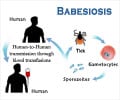A new study has found that exposure to toxoplasma, a disease carried by cats, may increase the likelihood of developing psychosis in high-risk young people.
- A long-term study was conducted on young people with a highrisk for psychosis
- Participants who transitioned to psychosis had higher antibody levels against toxoplasma, a disease carried by cats
- This finding can be used as a biological marker in individual psychosis risk calculators.
Exposure to toxoplasmosis, a disease carried by catsmay increase the likelihood of developing psychosis in young people already at risk, a new Orygen study has found. Toxoplasmosis
Toxoplasmosis is one of the most common parasitic infections caused by Toxoplasma gondii. This parasite is present in the cat's feces in the form of cysts.
According to the Centers for Disease Control and Prevention (CDC), over 60 million people in the United States are infected with the cat parasite.
Read More..
After a few weeks, the infection enters a dormant phase and can remain there for many years. It is during this stage that infection decreases the brain's immune response regulator norepinephrine.
Previous studies have postulated that behavior changes are invoked by the immune response to infection and alteration in chemical substances produced in the brain.
New Psychosis Risk Calculating Parameter
Based on these known facts, researchers conducted a long-term study on 96 people aged between 15 to 30 years, who were clients of Orygen's Personal Assessment and Crisis Evaluation (PACE) clinic and met high-risk criteria.
Psychosis is a symptom of serious mental disorders. People who are experiencing psychosis may have thoughts contrary to reality.
People who have grown up around cats must have been infected with toxoplasma at some stage. Usually, there are no symptoms, but in recent years, some links have been suggested between toxoplasma exposure and a range of conditions, including psychosis.
This new study investigates the criteria that can identify people at forthcoming risk of developing psychosis. This can be at the top of already proven criteria including clinical and biological risk factors.
"We found that exposure to Toxoplasma gondii may contribute to positive psychotic symptoms and increase the risk of transitioning to psychosis in high-riskindividuals”, said Lead researcher Professor Paul Amminger.
If this finding can be replicated in larger samples, toxoplasmosis serostatus can be used as a biological marker in calculators estimating the individual risk of psychosis transition in young people meeting high-risk criteria.
How is Toxoplasmosis Prevented?
We can reduce the risk of infection by:
- Eating fully cooked meat.
- Washing raw vegetables and fruit thoroughly.
- Washing hands thoroughly after handling raw meat or vegetables.
- Avoiding travel to developing countries with a high prevalence of toxoplasma, such as South America.
- If there is a pet cat at home, change the litter box every two days and periodically wash the litter tray with boiling water. Wear gloves and a mask to change the litter box.
- Keep pet indoors and do not feed it raw meat.
There are no vaccines for toxoplasmosis and no medications that can be taken to prevent the infection.
Pregnant women should practice these preventive measures if a blood test shows no previous infection and avoid exposure to cats.
References:
- Parasites - Toxoplasmosis (Toxoplasma infection) - (https://www.cdc.gov/parasites/toxoplasmosis/index.html)
- Toxoplasmosis - (https://www.nhs.uk/conditions/toxoplasmosis/)
Source-Medindia















